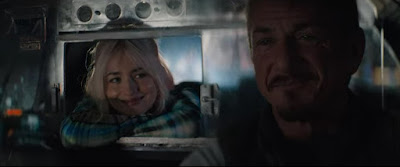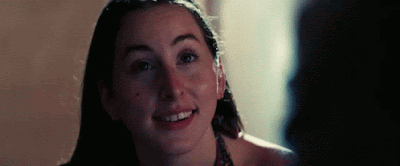Written at the time of the film's release. Recent events have compelled an update. All The King's Men (Steven Zaillian, 2006) The story goes that Robert Rossen, the director of the 1949 version of All the King's Men was not happy with his film. Too long, too talky, and too boring, Rossen was unsure of what to cut to get it down to length. A plan was drawn up: he told his editor to take 30 seconds from the beginnings of scenes and 30 seconds from the end. What was left came in under two hours of running time and moved at a jarring pace, but it won Oscars for its star Broderick Crawford, Best Supporting Actress Mercedes McCambridge...and as Best Picture.
All The King's Men (Steven Zaillian, 2006) The story goes that Robert Rossen, the director of the 1949 version of All the King's Men was not happy with his film. Too long, too talky, and too boring, Rossen was unsure of what to cut to get it down to length. A plan was drawn up: he told his editor to take 30 seconds from the beginnings of scenes and 30 seconds from the end. What was left came in under two hours of running time and moved at a jarring pace, but it won Oscars for its star Broderick Crawford, Best Supporting Actress Mercedes McCambridge...and as Best Picture.
All the King's Men was already a great film, but there were too many compromises to the Hays Code to get it to the screen. Steve Zaillian (a fine screenwriter, who directed a favorite film of mine Searching for Bobby Fischer) decided to make a new film of Robert Penn Warren's Pulitzer Prize winning book, and sadly, wasted the opportunity in a film convinced of its own importance.*
From the crack of thunder that appears before the opening credits, to the thudding James Horner score that telegraphs (with hammers) each imminent plot-point (Horner uses one dirge-like theme which, by its third appearance, I had assigned lyrics "This-is-a-sad-sto-ry/A-bout Lou-i-si-an-na"), to the subdued lighting and the art design in shades of "Godfather" mordant, everything about this movie promises great portent, but merely meanders through its story of how nothing born of corruption can come to any good, be it man, ideals or building materials.It's a frustrating film to sit through, because the pieces are there given a less respectful (as in funeral-respect) presentation. The cast is impressive. Kate Winslet and Mark Ruffalo and Anthony Hopkins play the well-to-do Stanton clan. Kathy Baker and Jude Law are the blighted Burden clan, and Sean Penn, looking more and more like a young George C. Scott, plays the fictional surrogate of Huey Long, Willie Stark. As his flaks and flunkies, James Gandolfini, Patricia Clarkson and Jackie Earle Haley.Good cast. But there are problems. Penn, as he is wont to do, goes over-the-top in his speechifying, his arms waiving wildly in the air, his fingers doing filigreed dances. Where Penn got the inspiration to play it this way is a mystery, as footage of Long in speech-mode (below) shows him much more in control. Not even Adolph Hitler emotes this much. Jude Law, never the strongest of actors, falls into the dreariness of the film, staring at the other actors or nothing-in-particular with sad doe-like eyes.** One suspects editing problems with this film—Zaillian did spend an inordinate amount of time in post-production on it. Subjects are brought up and dropped, like Stark's football-playing son, who figures prominently in the '48 film, is mentioned here and then never heard from again.*** We never do find out how Burden's mother acquires facts to make an accusation against him. Mark Ruffalo's character is left as a dissatisfying enigma.What we do get is ponderous, and pretentious. Zaillian spends a lot of screen-time trying to show (visually) that the only thing that could unite the "hicks" and gentry of Louisiana is death. Again, that same lesson has been told in better films.2023 Update: At the time the film came out, there was speculation that it was a "dig" at then-President George W. Bush. If so, it was bound to disappoint both sides, no matter where you came down on that particular president.
But, a re-watch today would make folks blanch—"well, that-tha-that's Donald Trump!"
Nope. Trump just borrowed from the same play-book that politicians have been using since politics became the world's "second oldest profession:" "Get elected by any means necessary. Cease power. Never let it go." That's the genius of Robert Penn Warren's book; he found inherent truths in the process and they continue no matter what generation after reads it. Sure, it seems like Trump—except for the details, the milieu, the accent. But, the autocracy is there. The crowd-whipping. The scandals. Warren could be accused of writing cliches. But, cliches are there because they're unerringly true and happen enough to become cliches.
For the truth is, politicians lie. And people look for a Messiah and want to be lied to. They eat it up. And the ultimate cliche. Absolute Power Corrupts Absolutely.
Just because it's a cliche doesn't make it not true.
* Given the awards-history of the cast and screenwriter it was assumed that this version of All The King's Men would be a top contender come Oscar-season, but its poor box-office reception scuttled those hopes.
** K (who likes Law) kept yelling out "accent-drop!" whenever his "Lawsiana" draw-el moved to Market Street. Anthony Hopkins, the sly old dog, doesn't even try.
*** Sadly, Zaillian, in an attempt to simplify his film, gutted some crucial scenes from it including the sub-plot about Stark's son, and an extended ending that provides the best scenes for Jude Law and Jackie Earle Haley.

























































